Snook (Family Centropomidae)
Species > Snook
Snook are a highly prized game fish due to it's aggressive fighting ability and delicious white flesh. Snook are excellent eating and fun to catch but do have strict catch limits and closures.

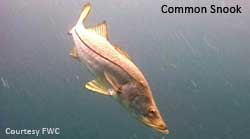 Snook can grow as large as 44 pounds and feed on small fish, shrimp and an occasional crab. Snook are protandric hermaphrodites, they are all born as males then some develop into females between 1 and 7 years of age. Snook are larger and grow faster in the Atlantic waters of Florida. Snook have a distinct black lateral line and beautiful yellow colored fins. When handling snook, always grab them by the mouth, their gill covers are razor sharp and can inflict severe injuries.
Snook can grow as large as 44 pounds and feed on small fish, shrimp and an occasional crab. Snook are protandric hermaphrodites, they are all born as males then some develop into females between 1 and 7 years of age. Snook are larger and grow faster in the Atlantic waters of Florida. Snook have a distinct black lateral line and beautiful yellow colored fins. When handling snook, always grab them by the mouth, their gill covers are razor sharp and can inflict severe injuries.
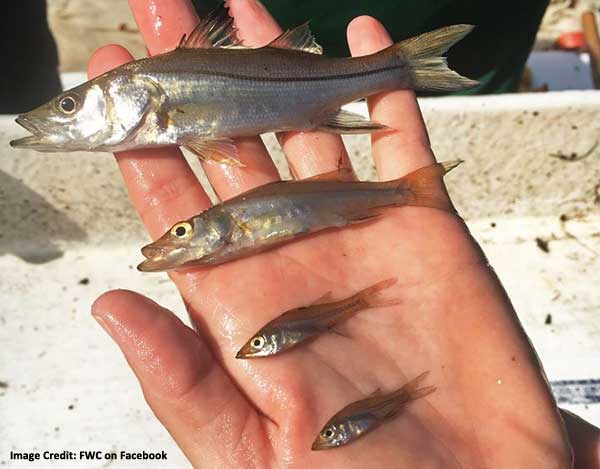
Types of Snook
FishBase has images of 12 species of snook, 5 of which reside in Florida waters:
- Common snook
- Small-scale fat snook
- Large-scale fat snook
- Swordspine snook
- Tarpon snook

Snook are a saltwater species that can tolerate a wide range of salinities. Snook often travel into brackish estuaries, sometimes venturing far inland into freshwater. Snook can be readily found in bays usually around structures and in shallow water off beaches, but mostly in southern Florida. Spawning in the summer months, snook congregate in large schools to spawn in deep passes and inlets.
On the east coast, from Sebastian south you have great numbers of snook, further north snook are limited due to the colder waters. Snook are very sensitive to cold temperatures and cannot survive in water temperatures below 60 degrees.
During the historic cold snap in 2010, the populations of snook around Florida suffered a huge loss. To revive the populations, regulations are in place with both size and take limits, varying by area.
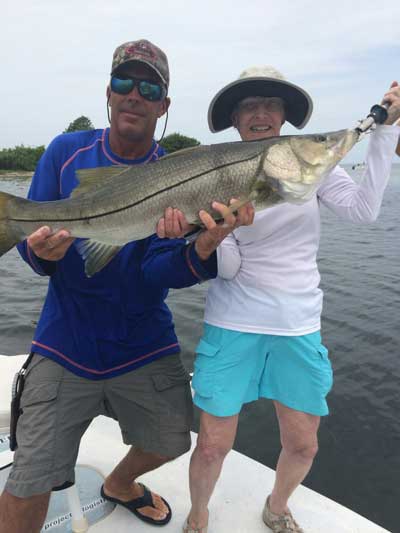
The huge snook in the picture to the right was caught out of season and released in Charlotte Harbor.
Harvesting Snook
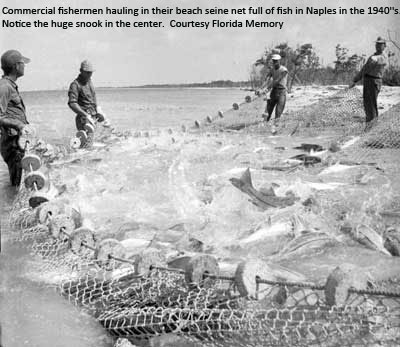 Snook were once so abundant that they were commercially harvested, hauled from the shore using seine nets. Today, the only allowable method of harvesting snook is recreationally using a hook and line; no spearing or netting allowed. And the sale of snook is not allowed in Florida and commerical harvesting is banned,.
Snook were once so abundant that they were commercially harvested, hauled from the shore using seine nets. Today, the only allowable method of harvesting snook is recreationally using a hook and line; no spearing or netting allowed. And the sale of snook is not allowed in Florida and commerical harvesting is banned,.
You need a saltwater license with a snook stamp to catch & keep snook in all Florida waters. Rules vary from the east coast to the west coast. Be sure to visit FWC's Snook Regulations page for rules specific to your area and do check every year as they are ever changing.
How to Catch Snook
Snook can only be harvested by hook and line, no spearing or netting is allowed. Snook are not the easiest fish to land. They tend to feed two hours before sunrise and two to three hours after sunset with the best fishing during a tide change at these hours.
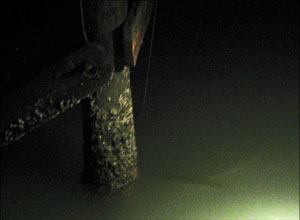
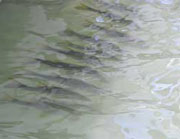 We have found the best bait for snook is shrimp taken from the same waters you are fishing (they turn their noses up to store bought live shrimp). So, you may wonder how to catch live shrimp? First off, fishing for snook at night is the best because snook are "ambush feeders", they hang out near structure below lights waiting to ambush shrimp (see the snook in image to the left). On outgoing tides shrimp gravitate towards lights and rest on pilings, so if you mount a light on your dock or your boat, shrimp will come to you! Grab a fine, long handled net and scoop up any shrimp that come by and put them on your hook and in your bait bucket or well. Catching shrimp during the day takes finding them, much more work! Snook will also hit live pinfish, small mullet, or sardines free-lined.
We have found the best bait for snook is shrimp taken from the same waters you are fishing (they turn their noses up to store bought live shrimp). So, you may wonder how to catch live shrimp? First off, fishing for snook at night is the best because snook are "ambush feeders", they hang out near structure below lights waiting to ambush shrimp (see the snook in image to the left). On outgoing tides shrimp gravitate towards lights and rest on pilings, so if you mount a light on your dock or your boat, shrimp will come to you! Grab a fine, long handled net and scoop up any shrimp that come by and put them on your hook and in your bait bucket or well. Catching shrimp during the day takes finding them, much more work! Snook will also hit live pinfish, small mullet, or sardines free-lined.

Catching snook in the surf is a lot of fun!
Contrary to popular belief, shrimp do not have to be large to catch big snook. Snook eat what is available in their waters, so use whatever size shrimp you collect for bait. Hook the shrimp in the head behind it's dark colored brain so it stays alive and kicking. Use a tiny bait hook on a loop and  give yourself at least 5 feet of very heavy leader line, snook love to wrap you line around pilings full of barnacles. Snook also have razor sharp gill covers which can easily cut your line (be aware of those gills when you handle a snook). Our favorite method of catching snook is to free line a shrimp on the edge of lighted water so the shrimp is swimming along. Or let out 5 feet of line, enough to hit the waters surface, and jump the shrimp so it lands on the water as if it jumped the way they naturally do. Swing your rod to the right and let the shrimp plop on the waters surface then immediately swing your rod to the left and let the shrimp fly over to the left and plop on the waters surface again. Go back and forth near a light and the snook will dive-bomb your bait. Always have a firm grip on your rod, snook hit hard and fast, dive bombing towards structure. Your goal is to keep the snook away from any pilings or structure so you can reel it in; if they get your line go around a piling, forget about catching that one.
give yourself at least 5 feet of very heavy leader line, snook love to wrap you line around pilings full of barnacles. Snook also have razor sharp gill covers which can easily cut your line (be aware of those gills when you handle a snook). Our favorite method of catching snook is to free line a shrimp on the edge of lighted water so the shrimp is swimming along. Or let out 5 feet of line, enough to hit the waters surface, and jump the shrimp so it lands on the water as if it jumped the way they naturally do. Swing your rod to the right and let the shrimp plop on the waters surface then immediately swing your rod to the left and let the shrimp fly over to the left and plop on the waters surface again. Go back and forth near a light and the snook will dive-bomb your bait. Always have a firm grip on your rod, snook hit hard and fast, dive bombing towards structure. Your goal is to keep the snook away from any pilings or structure so you can reel it in; if they get your line go around a piling, forget about catching that one.
Rare Snook Catch in Jacksonville April 2016
North of Sebastian on the east coast, it is rare to catch a snook due to the cooler waters. Rustin Murray caught a snook from a dock and sent us his report and pictures. Rustin says " "the last snook I heard of being caught in Jacksonville was in 2012. That is that the fish was reported being caught. We catch trout up here the way you guys catch snook in south Florida. He hit my hard bait so hard that I thought it was a redfish. The trout's mouth is a lot softer than the snooks. It's a lot harder to catch the big trout the way you guys catch the big snook. So you can say I'm way jealous. Really the only reason I submitted the picture is because of the location we caught it in Northern Florida. It is very rare to catch one up here. Hopefully that means the water is warming up nicely. Most of them died off up here in 1989 with a hard freeze. They were floating up on the beach is everywhere here back then and then again in 2010. Lord knows I was not proud of the size of the fish only the species." See another closeup picture of this rare snook catch on our Catch of the Month page, which also has another huge snook catch image

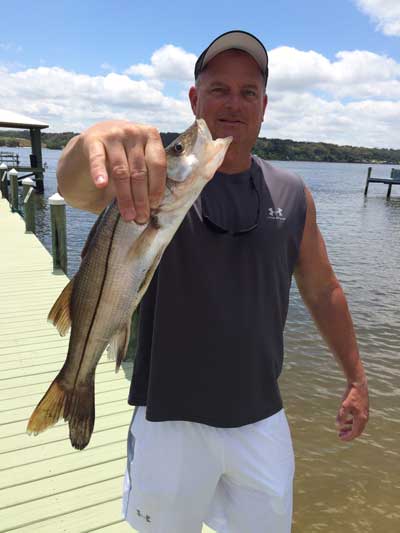
![]() FWC Snook Regulations & Season Closures
FWC Snook Regulations & Season Closures










